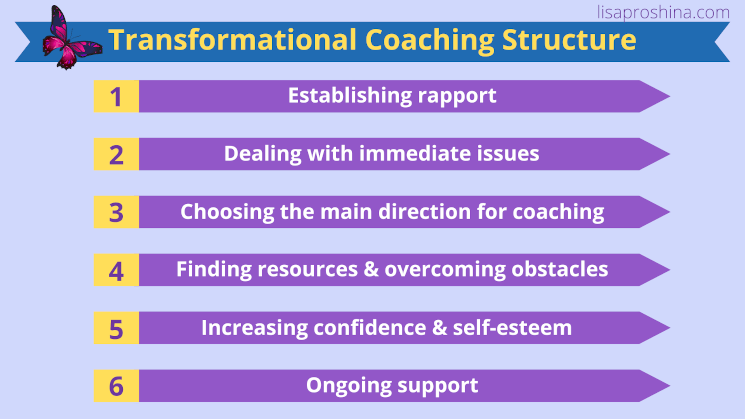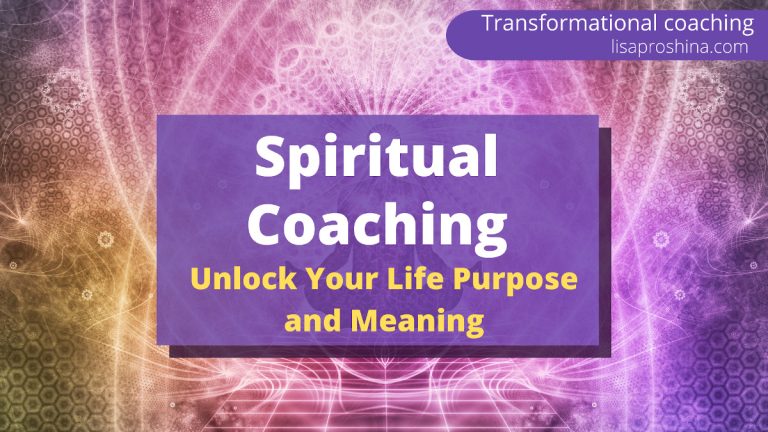Transformational Coaching Model
The Transformational coaching model doesn’t limit itself to one specific structure or framework. However, there are four core concepts in transformational coaching that can give you a better understanding of it.
In this post, you can read about the transformational coaching model core concepts and transformational coaching structure.
Table Of Contents
What Is the Transformational Coaching Model?
When we speak about the Transformational coaching model, we need to keep in mind a few basic things. Firstly, transformational coaching is client-focused and can be experienced differently by different people. And secondary, transformational coaching is still a form of life coaching based on different models of traditional life coaching. Usually, a transformational coach uses many different models depending on the client and their current needs.
For example, there are specific models to challenge or change a limiting belief, but there are different ones to explore and work with a person’s core values. The approaches, that are used for goal-setting and getting motivation are different from the ones that are used to process difficult emotions and go through challenging times. And each model is never rigid. A transformational coach is always present with the client so they can easily switch between models and approaches throughout the session to get the best results.
If you want to know more about transformational coaching, how it works, and how it can help you check my post: What is transformational coaching? or watch videos on my youtube channel about transformational coaching and self-development.
Transformational Coaching Model Core Concepts
There are four core concepts in the transformational coaching model. Transformational coaching is psychological, humanistic, integrative, and holistic. Let’s talk a bit more about each of them:

Humanistic
In transformational coaching, we always see clients as whole and unbroken. We know that clients don’t need to be fixed because they already have all the necessary resources to find what they need to do for the desired change. And as coaches, we just help them to connect with these resources, wisdom, and strengths.
That’s why transformational coaching is a non-advisory and non-judgmental approach. The goal of transformational coaching is to help clients find their own answers and resources. We don’t want the client to become dependent on coaching.
On the contrary, the best sign of effective long-term transformational coaching is when the client doesn’t need the coach anymore for their personal growth and transformation.
Psychological
We explore the client’s psychological patterns and paradigms and how they influence the client’s reactions, decisions, and eventually their life as well.
Sometimes a life-changing shift can happen when the client finally finds how some of their beliefs influence what’s happening in their life. And when client changes their paradigm, it usually helps to create changes in almost every aspect of their life. That is how inner transformation changes the whole life.
Working on this deeper level is one of the main differences between transformational and transactional coaching. If you want to know more about other differences check my post Transactional vs Transformational Coaching.
Integrative
As I explained above, there is no such thing as some fixed transformational coaching model. A wide range of different approaches and models creates transformational life coaching. Each coach finds their unique way of working with each client and their unique situations by integrating the best tools from different schools.
This transformational coaching model concept makes the transformational coaching approach unique and client based.
Holistic
In transformational coaching, we consider all aspects of the client’s experience: emotional, cognitive, behavioral, and somatic. We explore how all these aspects influence each other depending on each different client.
Tools from CBC (Cognitive Behavioral Coaching) are very effective for this, and they bring a lot of clarity for the client and the coach.
Transformational Coaching Structure
As I have mentioned before you can’t limit transformational coaching to one specific structure or framework. However, I’ve found this transformational coaching structure the best to explain the process of transformational coaching.

It’s not some rigid structure that every coach uses, but it can give you an overall picture.
1. Establishing rapport
To get good results from transformational coaching, you’ll have to be honest and open. That’s why it’s important to have a rapport and to trust your coach. And establishing this rapport is the first phase of the coaching process, which later will lead to trust.
2. Dealing with immediate issues
Some clients come into coaching already having quite clear idea about what they want. However, most of them don’t. They have some problems and challenges that they need to deal with.
And the beginning of the coaching is quite often about dealing with these immediate issues before we can move forward.
3. Choosing the main direction for coaching
At this stage, we are looking for what the client really wants. We explore their expectations from coaching and core values. It may take some time for the client to choose the main inspiring goal.
Even when the client comes with a specific goal you still need to check with them if that’s what they really want. There are many ways to do it. Working with values is one of the best of them. Many coaches use it as a part of their transformational coaching model.
4. Finding resources and overcoming obstacles
Once the client has a clear goal, it’s time to start taking action. During phase 4, we work on motivation and planning specific steps. But this is only one small part of it.
Usually, we go deeper and look for what is holding back the client. That’s where work on finding and changing limiting beliefs comes in place.
The psychological concept of the transformational coaching model is exactly about working on the level of beliefs, values, and paradigms.
5. Increasing confidence and self-esteem
Increased confidence and self-esteem is one of the transformational coaching benefits, that almost every client experiences.
There are two ways how transformational coaching helps with it. One way happens naturally because during the coaching process clients make some changes, solve problems and achieve their goals. This results in better self-esteem.
However, the other significant part is working on the mindset. One of the important transformational coaching skills is to help clients start seeing their strengths, focusing on achievements, and believing in themselves.
6. Ongoing support
Depending on each specific situation and client’s goals, transformational coaching can last for different periods of time. To have a noticeable and long-lasting change in the mindset I usually recommend having at least 5-6 sessions during 1-2 months.
After that clients can decide if and for how long they want to have ongoing support from a transformational coach. It usually depends on how big the change they expect to achieve.
Final words
Transformational coaching model or structure are never rigid. The beauty of transformational coaching is that it integrates different approaches and uses the most effective tools and frameworks.
Each client with their unique situation is the center of the transformational coaching model. And our job is by using our knowledge, skills, and experience to help them create the desired change, achieve their goals, and enjoy the process of transformation.







